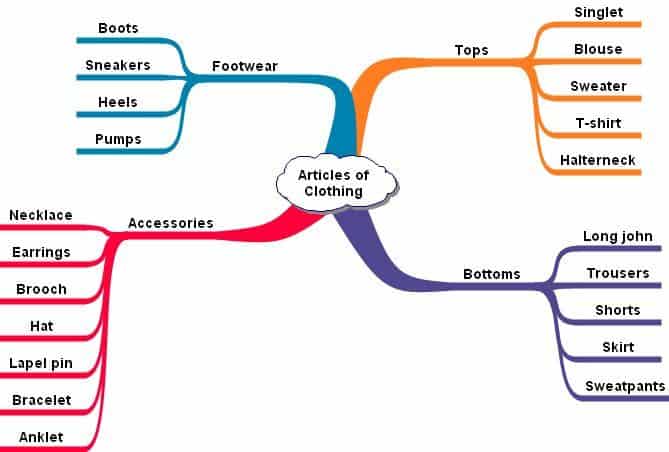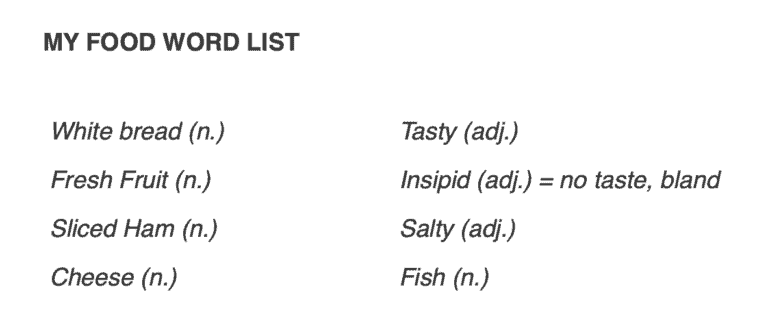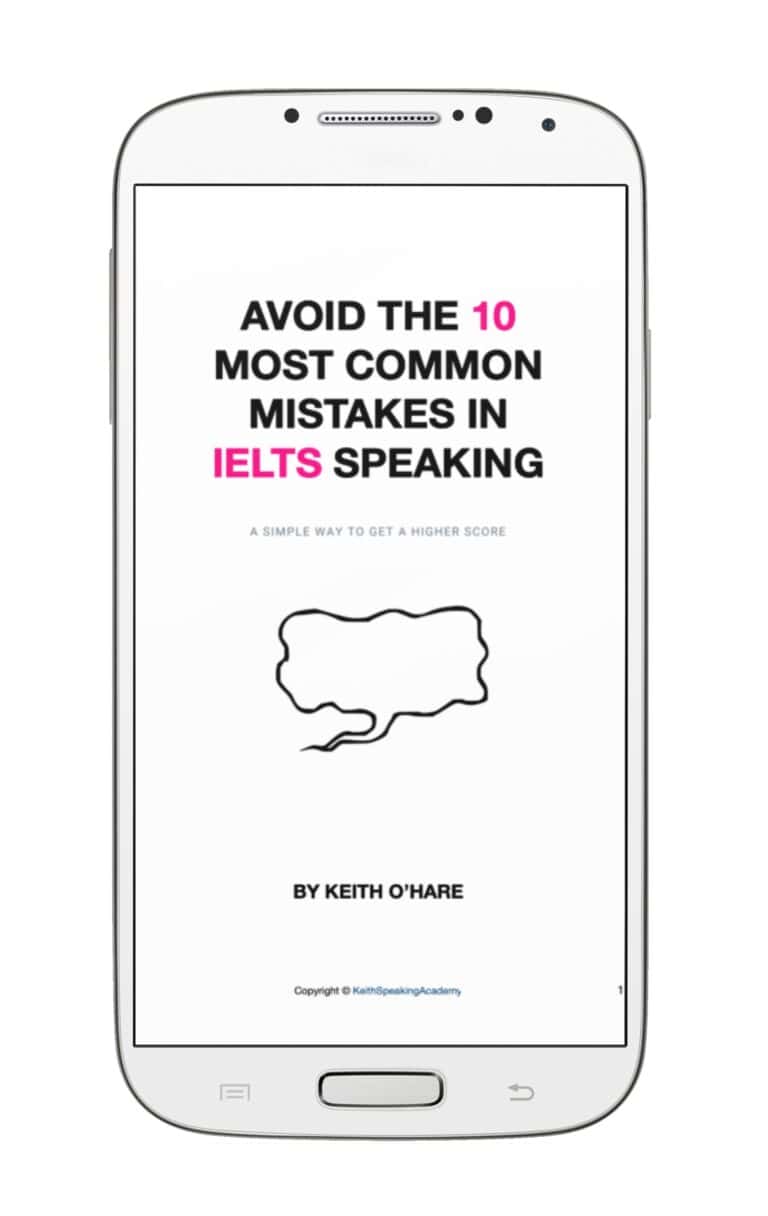IELTS Vocabulary | The Ultimate Guide
👇 Take this lesson with you! 👇
Are you sometimes confused about or overwhelmed by IELTS Speaking vocabulary? It can be difficult to know what to learn and where to start.
In this ‘Ultimate Guide’, I show you what kind of vocabulary to learn, how to learn it, some memory tricks, and also how to make sure you can actually use the words and speak fluently in the IELTS Speaking Test.
Table of Contents
IELTS Speaking Vocabulary Topics
In order to enrich your IELTS Speaking vocabulary, you need to learn words and expressions on a wide range of topics.
Click the link below to see a list of such topics. Each one has a complete lesson with extensive vocabulary lists, including collocations, idioms and idiomatic expressions.
A list of the kind of common IELTS Speaking topics you may get.
How can I Improve my Vocabulary for IELTS Speaking?
As we can see in the IELTS Speaking Band Descriptors, vocabulary is important in two ways;
1. The range of vocabulary
2. The accuracy of vocabulary
Also Vocabulary counts for 25% of the Speaking mark. I personally believe it’s the one area that is easier to improve in a short time. Whilst pronunciation and fluency take time to develop, we can increase our knowledge and use of vocabulary, if we study well and practice lots.
The best way to improve vocabulary for IELTS Speaking is,
- Study a wide range of topics
- Make notes of new words and phrases
- Always learn words in context
- Focus on collocations of new words
- Use different techniques to remember words
- Practice and activate new vocabulary
Which Words are Used in IELTS Speaking?
Different kinds of vocabulary are important for IELTS Speaking.
We can find out which ones are important very quickly by looking again at the IELTS Speaking Band Descriptors
They talk about:
Collocations
These are words that commonly go together
For example,
black tea
spicy food
heavy rain
Idiomatic expressions
These are expressions where the meaning of the expression is different from the meaning of the individual words.
For example,
He kicked the bucket (= He died)
I am tickled pink (= I am very happy)
A wide range of vocabulary, enough to discuss a variety of topics, this will include
- synonyms (words with similar meanings – e.g. pretty and beautiful)
- antonyms (words with the opposite meaning – e.g. big and small)
- word families (words with the same root – e.g. economic (adj.), economy (n.), economise (v.)…)
Vocabulary for Familiar Topics.
These are ones you might talk about everyday, and may include, family, home, hobbies, work, everyday life, shopping…
Vocabulary for Unfamiliar Topics.
These are ones you don’t usually discuss everyday, and may include, Climate Change, economics, globalisation, law and similar topics or even more specialised topics such as photography, fishing, calligraphy, leadership…
Style
This is includes using spoken rather than written language, and natural conversational language rather than an academic language.
For example, you would say,
I get up at six
You wouldn’t say,
I arise from my slumber at six o’clock
Phrasal verbs
Finally, I would also add, it is worth spending time learning phrasal verbs, as these are extremely common in spoken English and will help you sound much more natural.
Phrasal verbs are basically verbs plus a preposition, for example,
To put off (= to postpone)
To take away (= to remove)
To cut down on (= to reduce)

IELTS Band 9 Vocabulary
Does Band 9 vocabulary exist?
Not really, and you should not try to use fancy vocabulary that you don’t know how to use; you will make mistakes, and this will bring your vocabulary score down.
It’s much better to learn vocabulary at your present level (e.g. Band 6) as well as the vocabulary just above your level, what I call ‘level + 1‘ (e.g. Band 7).
It is true that publishers and book writers do create word lists at different levels, and they try to include, or focus on these words in their course books for different levels.
For example the English Profile database is such an example.
However, I think such a word list has little use for a student. Why?
Because you cannot see how to use the word; there is no context.
So focus on learning vocabulary just above your level (level+1), not fancy ‘band 9’ vocabulary that you may not know how to use.
How to Record New Words?
So, imagine the situation.
You are studying for IELTS, maybe listening to an audio sample answer.
You find some new words you think are important.
What do you do?
Well, whenever possible, I recommend the following;
- Write down the word and the form (is it a verb, noun, adjective…?)
- Note the words before and after it. In other words check the collocation. You can use OZDIC to help you.
- Write a sample phrase, so you can always see how it is used
- Make an audio recording of new words (maybe on your phone – somewhere easy to access and listen to)
Watch this video below to see how I do this.
How to Remember Vocabulary
Frequency
There are many different ways to remember words and you will need to find the one(s) that work best for you.
What is true for everyone though, is that after 24 hours, if you do not review something you have learnt, you lose about 70% of it!
That’s huge.
The message is simple – review new language before you go to bed, don’t wait more than 24 hours.
Techniques
Here are some of the more well-known ways of remembering vocabulary.
Which of the following techniques have you tried?
Mnemonics
1. In order to remember useful conjunctions in English, we can use the acronym FANBOY
For, And, Nor, But, Or, Yet, and So
2. To remember how to spell words we create a sentence. For example, I often struggle with ‘b-e-l-i-e-v-e’
So I use this phrase ‘never believe a lie‘
3. To remember a new word like ‘snorkelling‘ I make sound associations. I imagine a man snorkelling, but he fell asleep and died. He ‘snores‘ (when asleep) and it is ‘killing‘ him.
Mind Palace
This was popularised by Sherlock Holmes – well at least the new one. Watch it in action below.
So, here you imagine a house with many rooms. You visualise each room and you ‘put’ a new word (from your word list) into each room. Then you practice visiting each room and collecting the word there.
Word lists
Mind Maps
These are extremely useful ways of recording words, phrases and information.
They work because the method of storing the information, via a visual map, is the same way our brain works. So, it is easier to recall words when you need them.
You can make mind maps based on themes, synonyms, meaning or even collocation.
Colours and images make them more powerful.

How to Activate Vocabulary
We have 2 kinds of vocabulary
1. Passive
Words that we recognise when we see or hear them, but we can’t use yet when speaking.
2. Active
Words that we can use as well as recognise
You may ‘know‘ lots of words (you recognise them), but if you can’t use them, they won’t help your speaking!
It is really important to start using words, to activate them, so they become part of your active IELTS Speaking vocabulary.
This can then help you improve your speaking skills.
The key to activating words is to do things with them!
Here are 2 simple things you can DO with new words.
1. If you have a word list, put the words into different groups.
For example, with this FOOD word list, I can put them into groups such as things
I like / don’t like
Healthy / Unhealthy

Example sentences in dictionaries usually make no connection to our own lives, but by connecting language to our own lives, we are more likely to activate it.
For example,
I rarely eat white bread in the morning, I prefer fresh fruit.
Where to Learn New IELTS Speaking Vocabulary
Always learn new vocabulary in context.
This is important so you know how to use the word or expression.
In order to learn spoken and natural English, you should try to learn a large part of your vocabulary from speaking sources.
That means you learn it from listening to things like,
- TV debates
- Talk shows (e.g. https://www.youtube.com/user/GMB)
- Soap operas or sitcoms
- Podcasts
- Radio
- IELTS sample answers (in audio or video format)
When learning by listening you can know,
- that the language is ‘spoken‘ not just written
- the context, or kind of situation (e.g. when talking to a shop assistant) where it is used
- how it is used (e.g. collocation)
- correct pronunciation and intonation
Find a list of useful Podcasts here (scroll to Podcast section)
So, now you can start using a variety of techniques to improve your IELTS Speaking vocabulary.
If you liked this guide, or you want to share your own tip about how you learn vocabulary leave a comment below!
As a community we can all learn together.


